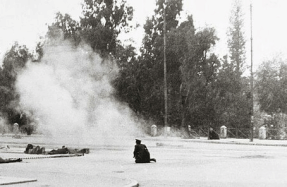ASSAULT ON THE REICH


James Holland is an award-winning historian, writer, broadcaster and best-selling author He is also co-founder of the Chalke Valley History Festival, a fellow of the Royal Historical Society, and co-host of weekly podcast We Have Ways of Making You Talk
A little after 6am, on Saturday, 18 November 1944. It was still dark and raining as Operation Clipper, the battle to smash wide open the Siegfried Line at Geilenkirchen, began. It was also freezing cold. “The draught on my back wasn’t funny,” noted Arthur Reddish, the gunner in Major John Semken’s A Squadron. The assembly area was about 730 metres south of a railway embankment, near a large farmhouse, which was already wrecked and surrounded by what a couple of months earlier would have been a lovely, lush orchard but was now desolate. Immediately north of the farm, running for around 350-450 metres, was a dense minefield; then came the railway, with enemy troops dug in on the reverse slopes. A little further eastwards, towards the village of Immendorf, were three concrete bunkers immediately south of the railway, with a further three to the north of the Geilenkirchen-Immendorf road. More bunkers stood behind these, and more mines.
Not for the first time, the Sherwood Rangers Yeomanry had been paired with American infantry, although this time those of the 84th ‘Railsplitters’ Division, only arrived in Europe in October and never before tested in combat. The plan was for flail tanks, with their rotating chains, to clear two lanes through the minefields and for
You’re reading a preview, subscribe to read more.
Start your free 30 days





